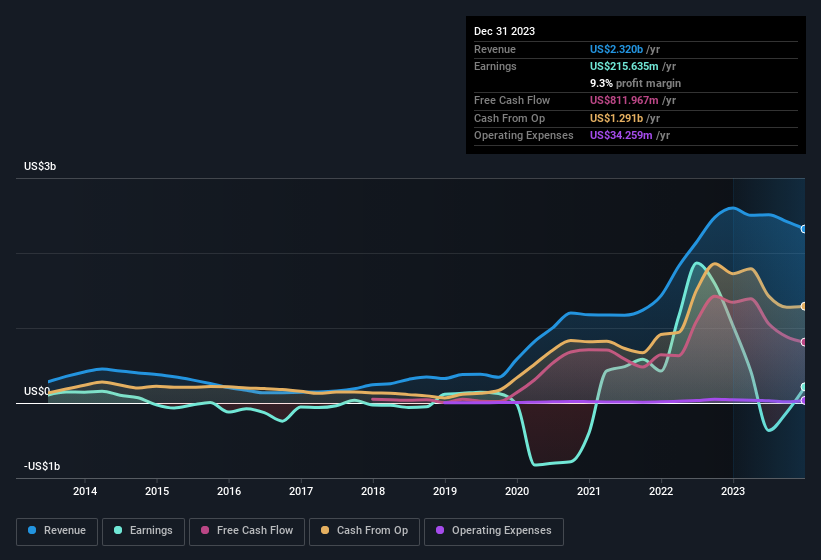- United Kingdom
- /
- Oil and Gas
- /
- LSE:ITH
Some Investors May Be Willing To Look Past Ithaca Energy's (LON:ITH) Soft Earnings

Shareholders appeared unconcerned with Ithaca Energy plc's (LON:ITH) lackluster earnings report last week. Our analysis suggests that while the profits are soft, the foundations of the business are strong.
View our latest analysis for Ithaca Energy

A Closer Look At Ithaca Energy's Earnings
One key financial ratio used to measure how well a company converts its profit to free cash flow (FCF) is the accrual ratio. In plain english, this ratio subtracts FCF from net profit, and divides that number by the company's average operating assets over that period. This ratio tells us how much of a company's profit is not backed by free cashflow.
As a result, a negative accrual ratio is a positive for the company, and a positive accrual ratio is a negative. That is not intended to imply we should worry about a positive accrual ratio, but it's worth noting where the accrual ratio is rather high. That's because some academic studies have suggested that high accruals ratios tend to lead to lower profit or less profit growth.
Ithaca Energy has an accrual ratio of -0.18 for the year to December 2023. That indicates that its free cash flow quite significantly exceeded its statutory profit. Indeed, in the last twelve months it reported free cash flow of US$812m, well over the US$215.6m it reported in profit. Ithaca Energy's free cash flow actually declined over the last year, which is disappointing, like non-biodegradable balloons. However, that's not all there is to consider. The accrual ratio is reflecting the impact of unusual items on statutory profit, at least in part.
That might leave you wondering what analysts are forecasting in terms of future profitability. Luckily, you can click here to see an interactive graph depicting future profitability, based on their estimates.
The Impact Of Unusual Items On Profit
Surprisingly, given Ithaca Energy's accrual ratio implied strong cash conversion, its paper profit was actually boosted by US$44m in unusual items. We can't deny that higher profits generally leave us optimistic, but we'd prefer it if the profit were to be sustainable. When we crunched the numbers on thousands of publicly listed companies, we found that a boost from unusual items in a given year is often not repeated the next year. And, after all, that's exactly what the accounting terminology implies. If Ithaca Energy doesn't see that contribution repeat, then all else being equal we'd expect its profit to drop over the current year.
Our Take On Ithaca Energy's Profit Performance
Ithaca Energy's profits got a boost from unusual items, which indicates they might not be sustained and yet its accrual ratio still indicated solid cash conversion, which is promising. Based on these factors, we think that Ithaca Energy's profits are a reasonably conservative guide to its underlying profitability. With this in mind, we wouldn't consider investing in a stock unless we had a thorough understanding of the risks. Every company has risks, and we've spotted 2 warning signs for Ithaca Energy you should know about.
In this article we've looked at a number of factors that can impair the utility of profit numbers, as a guide to a business. But there is always more to discover if you are capable of focussing your mind on minutiae. Some people consider a high return on equity to be a good sign of a quality business. While it might take a little research on your behalf, you may find this free collection of companies boasting high return on equity, or this list of stocks that insiders are buying to be useful.
New: AI Stock Screener & Alerts
Our new AI Stock Screener scans the market every day to uncover opportunities.
• Dividend Powerhouses (3%+ Yield)
• Undervalued Small Caps with Insider Buying
• High growth Tech and AI Companies
Or build your own from over 50 metrics.
Have feedback on this article? Concerned about the content? Get in touch with us directly. Alternatively, email editorial-team (at) simplywallst.com.
This article by Simply Wall St is general in nature. We provide commentary based on historical data and analyst forecasts only using an unbiased methodology and our articles are not intended to be financial advice. It does not constitute a recommendation to buy or sell any stock, and does not take account of your objectives, or your financial situation. We aim to bring you long-term focused analysis driven by fundamental data. Note that our analysis may not factor in the latest price-sensitive company announcements or qualitative material. Simply Wall St has no position in any stocks mentioned.
About LSE:ITH
Ithaca Energy
Engages in the exploration, development, and production of oil and gas in the North Sea.
Mediocre balance sheet low.
Similar Companies
Market Insights
Community Narratives




